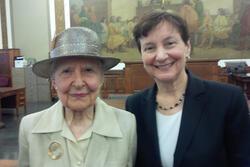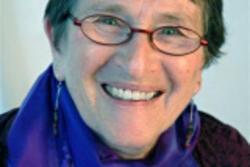Beate Sirota Gordon
An unexpected champion for women’s rights in post-war Japan, Austrian born Beate Sirota Gordon was an inspiring intersectional feminist. At age of 22, and fresh out of college with a degree in modern languages, Gordon, along with a small team of Americans, was responsible for writing Japan’s constitution in the aftermath of World War II. As the only woman on the team, Gordon wrote equal rights for women into the new constitution.
Gordon wrote Article 14 of Japan’s constitution: “All of the people are equal under the law and there shall be no discrimination in political, economic or social relations because of race, creed, sex, social status or family origin.” In 1946, almost twenty years before the United States passed the Civil Rights Act of 1964, outlawing discrimination based on race, color, sex or national origin, Gordon incorporated this ground-breaking clause, that didn’t yet exist in American democracy, into Japan’s constitution.
Adding equality for all people under the law to the Japanese constitution was no small feat. For one, it reversed centuries of unequal relationships between men and women dating back to feudal Japan. But it also fundamentally tied civil rights to Japan’s democracy. The bombings of Hiroshima and Nagasaki made the statement that the US saw the lives of Japanese civilians as less important than the lives of American citizens. By contrast, Gordon’s contribution to the constitution affirms the equal value and dignity of all people despite their differences—a crucial component of intersectionality.
Gordon also wrote an article for the constitution giving specific rights to women in key areas such as inheritance, divorce, and property rights. No such article exists in the US constitution.
What I find to be so fascinating about Gordon’s storyis that her love of languages opened doors for her that enabled her to impact many different people. Gordon spoke English, Japanese, German, French, Spanish, and Russian fluently, and studied even more languages in college. This skill was what got her to Japan, as an interpreter for General MacArthur, who led the effort to write the constitution. Knowledge of many languages gave her a broader worldview and the ability to communicate effectively with so many different people.
I believe that a key aspect of intersectional feminism is often overlooked: global reach. Discussions of feminism solely in the context of the US miss out on the interconnectedness of the whole world. We tend to think about intersectionality as being limited to clearly delineated categories like race, class, ability, sexual orientation, gender, etc…, when the truth is that intersectionality is boundless. We can all work on expanding our worldviews to become more intersectional. Gordon’s story is filled with lessons about how to expand our worldviews: appreciating art from various cultures, studying world history, immersing ourselves in new languages, engaging with local people when traveling, and living in other countries.
Oftentimes when women are underrepresented, their voices are silenced, but Gordon was given immense power to pen gender equality under the law into Japan’s constitution. She was privileged to have such power, as well as the skills and the means to make this historic accomplishment—but what’s most important is that she used the privilege and resources she had for good. I’ll be going off to college next year, and though my perspective feels limited to me right now, in learning more about Gordon’s story and experience, I hope to be able to greatly expand my worldview in this next chapter of my life. I can only hope to live a life like hers, filled with the richness of beauty, art, travel, and a true understanding of and respect for humanity.
This piece was written as part of JWA’s Rising Voices Fellowship.








Awesome!